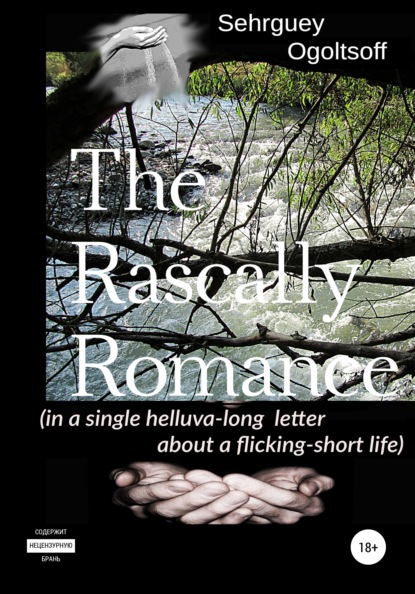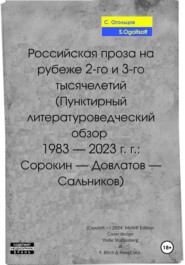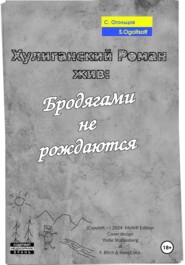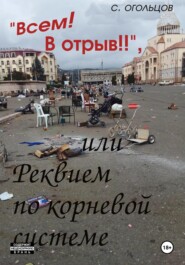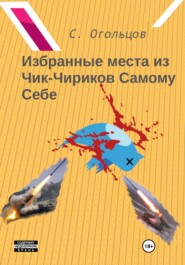По всем вопросам обращайтесь на: info@litportal.ru
(©) 2003-2025.
✖
The Rascally Romance (in a single helluva-long letter about a flicking-short life)
Настройки чтения
Размер шрифта
Высота строк
Поля
"What handkerchief? I've never seen any."
In general, that's correct. To see a thing you have to know what you're looking for. I, for example, could not recognize the sea at once.
(…so the sailing boat had not found its anchorage and, later on, it disappeared too. For all I know, it might be still sailing expanses of the universe somewhere…)
It was not what you’d call inspiring news to learn from Eera, that in the maternity hospital she was informed that her hymen had not been completely busted, and you had to finish it off from inside.
Though embarrassed, I still did not feel much difference, if any, after my wife lost her virginity in such an unconventional way. Yes, there was a certain feeling of guilt for that overly stealthy night in Bolshevik, yet since then I always was shooting the bolt my level best, unreservedly. Besides, she was not the first virgin to give birth…
(…leaving aside the Holy Family, our particular case was the result of textual programming thru the novel by a French writer, Herve Bazin, which I read back in my adolescence.
Although there was no childbirth in that work, I still should not be allowed to read just anything at all…)
I went to Konotop to collect warm clothes, the sheepskin coat, rubber high boots. My father gave me his navy black pea-jacket with copper buttons in 2 upright rows. I even took my guitar with me, because I was moving in earnest to stay there.
And in Konotop, they also kept grumbling that there had remained only half of me, but I never was in finer fettle indeed… My mother wrapped the things in a white cloth and sewed it up; it turned out a bulky and thick bale.
Yet, I had to do one more thing. To do and – cut and run. To do, and lie low at the bottom, in the mine "Dophinovka"…
(…throughout all those five years plus, I was perfectly aware that everything should be paid for. Nothing is given for nothing. And I don't mean money for pot, which goes without saying. I mean the main payment for getting stoned, high, and on the flights. And the closer to the final full-stop in the trough of the common urinal at the Kiev intercity bus station, the deeper I realized that I even knew who exactly was paying the unreasonably high—more expensive than any money—price for my buzz.
I had neither desire nor occasion to share that knowledge to anyone, because it was so complete crazy nonsense. Nutty hooey. That's why I silenced it and kept it hidden and buried away, even from myself, but it came back to me over and over again, even at my not-stoned moments, that I was irredeemably indebted to the long-suffering people of Cambodia sweating in the swelter of the sub-equatorial hothouse climate of South-Eastern Asia. And there was no forgiveness for me…
Nothing comes from nowhere, and it is the immutable truth. The tactile sensations at my maiden getting high, in the stoker-house of the construction battalion, established an inextricable link between blowing jive and getting smashed in the brains.
Subsequently, the rigor of the correlative interdependency dissolved, but the buzz continued to flow in. Which gives rise to a question: if not me, then who is smashed in the brains?
By the end of the five-year-plus period there came the answer. The Khmer Rouge troops, when seizing another village, killed its inhabitants, the same Cambodians as themselves. To save the ammo, they were butchering them by bamboo club blows against their skulls. Then they turned the bodies on their backs and photographed dead faces, like for a passport. In those pictures, the right eye is half-closed and the left one bulging out.
I saw them. Multiple rows of those pictures—dead people with feline faces—were regularly placed in the central newspapers. They looked like some different non-human race, them those people with their, as if skinned, faces. I had what to feel guilty about.
Of course, after the events accompanying my first flight to Odessa, the peasants' brains were not any longer being smashed out for me, which did not stop the show so that someone else would get a kick.
In Odessa, I found myself amid a universal battle of who knows who against whoever else. In the course of inconceivable vicissitudes, I became a some who's ally, making enemies with whoever else, still remaining in the complete dark as to who is who?
One thing was totally clear though, that those, with whom, as willed by fate, I happened to be on the different sides of the barricades, would not fail to track me down and square the accounts. It's no coincidence that, the moment I got off the Kiev-Moscow train in Nezhyn, a window in one of its cars opened and a glassy-eyed (apparently from the monad of the chief engineer) spit out a long streak of saliva on the platform. He undoubtedly was leaving a signal mark for other militants from their dark legion where to pick up the trace of my further perambulations and follow my subsequent movements up to Konotop. And there, they would easily and inevitably discover the cannabis plantation at the end of the garden of my parents' khutta in the Settlement. With incalculable and unimaginable consequences of the most horrid nature.
My duty before the unknown allies, and before the remains of still not finished off peasants at their squalid villages in the humid depths of jungles in South-Eastern Asia prompted the only right decision…)
In the shed at Decemberists 13, I took the bayonet-type spade and went to the plantation in the remotest bed.
They stood proud of their almost three-meter height; issuing the piercing rich aroma.
…forgive me, I know you're eager to live, forgive that I was late for that train to Odessa, but now I have to do what I have to, forgive me…
And they were falling—one after another, one next to another, one on top of another—from the bayonet strikes piercing deep, slicing the roots, cutting the life off…
I stacked them in a high pile, went back to the shed and returned with the jerrycan of gasoline. The crackling fire rose up, the thick white smoke floated.
Alerted by auntie Zeena, my mother hurried to the garden, "Sehryozha!. What are you… Why?. How is it?.."
"It must be done."
She left, and my brother Sasha came instead, "Sehryoga, what are you at?"
"It must be done."
My brother always believed that I knew what I was doing, even when I did not know it myself. He stopped asking me and just stood there, and we both watched the fire turning the dense green of the trunks and branches dumped on a pile into black charred sticks and fine ash, brittle, white…
~ ~ ~
The aircraft landed in the Odessa airport at midnight and I managed to be in time for the 6.00 bus from the New Bazaar bus station. Outside the city, irresistible slumber overcame me so that I missed the stop and woke up only after 300 meters past it. At my request, the driver stopped the bus atop the ascend, and I crossed the windbreak belt.
In the garden of the outermost cottage amid the thinning dusk of the retreating night, an elderly mujik in his underwear and a woman in a white nightgown swept, for some reason, the beds with brooms. They moved in a strange, robot-like, way. The mujik's eyes were filmed with the glassiness. I did not see the woman's eyes though, she was careful to keep them averted. Rather strange agricultural practices for so early an hour, but I could hardly be surprised by anything already.
In my four-day absence, they did not bring any asphalt. But the pinkwashed outside plaster of the old hostel walls had got spattered with blue splashes and dispersed lines as if to camouflage the barrack. But why blue?.
I got in the everyday groove at the mine. The weather changed because one day coming back from Odessa, I found that in my pocket remained just a single three-kopeck patina-blackened coin. "That's not money," thought I to myself and threw the coin back over my shoulder, among the trees of the windbreak belt. For exactly 3 days thereafter, the cold wind blew from the sea, refuting my dismissive opinion of the 3 kopecks, and making me get the message in the byword "to throw money to the wind".
The electrician, my neighbor opposite the corridor, died on the road from Chabanka before reaching the hostel. They found him 3 days later. I always knew that was a dangerous stretch of the road. In summer, there were constantly flying fluffy spherical balls, like to sea mines, but white and smaller, of course. Probably, one of them scraped the defunct, when he was unaware or failed dodging.
They buried him in the village cemetery, on the cliff between the highway and the sea. Kapitonovich was carrying a wooden cross ahead of the coffin, like a banner, but he himself had a sash of a long narrow towel tied in a diagonal loop from one of his shoulders, the way best men of grooms adorn themselves at village weddings, instead of pinning a handkerchief up the jacket sleeve as was the custom at funerals in Konotop. What else might you expect of them? They’ve heard the song but got the wrong sow by the ear.
In the father's black pea-jacket with yellow buttons, I presented a colorful figure, like, a seaman from the black-and-white movie "We are from Krondstadt", but I also helped to fill up the grave. Then we were taken back to the hostel by bus. The women from the mine office in the pit prepared the wake feast from their home supplies. I wolfed a disgracefully enormous amount of every viand like on the visit to the Tshombe's field camp in my student years…
The repaired radio set was brought back to the hostel, and I had to move into the room of the diseased electrician. Soon Vasya, the new roof-fastener, joined me there. At first, I doubted his sex, when accidentally noticed red-brown stains on his bedsheets, as if from menstruation. He hurried to explain, that they were from a tomato that rolled under his blanket and he kicked it to squash in sleep, although I hadn't been asking about anything at all. That hostel's just another Bellamy Isle with everyone around reading your thoughts before you had the time to think them off. However, what simple explanations might sometimes be found for incomprehensible, at first glance, facts…
Autumn came into its own. I inserted glass into the window frame of the respective room in our would-be two-room apartment, however, they still were not bringing any asphalt… And so it went on in its everyday manner until the moment when the chief engineer came from Vapnyarka and said that I was announced wanted in the all-Union hunt, and the mining management received a letter from the NGPI with accusations of sheltering a runaway who shunned working off at the place of his appointment.
"So, write the application."
"What application?"
"Requesting to fire you of your own volition."
"I have no such wish."
"We cannot retain you here after such a letter."
As I stubbornly negated any desire for leaving, a compromise was found, based on one of many articles in the Labor Code of the USSR: "dismissal by agreement between the parties". Thus, instead of a chosen, I became just a party…
In the end, I had a parting walk about Odessa streets in the sheepskin coat wide open, like a soldier from the Peasant Army of Nestor Makhno, and in rubber high boots bravely splashing across the puddles left by the recent heavy rains. When back in the hostel, I packed them in a bale with the rest of my clothes and the tools which I had started to collect already, one by one: a hammer, an ax, a saw, an iron, an electric water heater, and a white enamel kettle.
(…the night I was bringing it from Odessa it was real dark with some primeval darkness that you meet once or twice in your lifespan, darker than in abandoned galleries without the flashlight. All the way from the Dophinovka village to the same named mine I was singing to perk the kettle up, not let it get too spooky. No, not whistling in the dark but singing and shuffling the road too so as not to miss the right forks, all the way to the farm-like barracks of the miner’s hostel, which I could see by simply groping at that time, all the songs I could remember. Maybe, for personal tone up as well, yet only in part for it is a disgrace for a chosen which I was at the moment to be afraid of darkness. Only in the dark you can see light and become enlightened, right? And become an initiated chosen. Only they found me there and cut off and out of that game for kids. Damn!.)
The bale was taken to the station and sent off by a luggage car. Then I returned to the hostel where a recently bought briefcase and sports-bag Aerobica were sitting together with the guitar, before starting to the airport the following morning.
Slavic Aksyanov dropped into our room. We finished off a whole pan of fried potatoes under "The Bolero" by Ravel from Vasya's receiver. I told Slavic to fix the door to the toilet booth above the sea inlet. It was kicking back in the tall grass, I had seen it there. He swore to execute my last wish. However, just in case, I threatened that if he did not, I would haunt him the way the Hamlet's father’s ghost was molesting his sonny. A genuine funk flashed in his eyes. Who would have ever supposed that even they were afraid of spooks?!.
In general, that's correct. To see a thing you have to know what you're looking for. I, for example, could not recognize the sea at once.
(…so the sailing boat had not found its anchorage and, later on, it disappeared too. For all I know, it might be still sailing expanses of the universe somewhere…)
It was not what you’d call inspiring news to learn from Eera, that in the maternity hospital she was informed that her hymen had not been completely busted, and you had to finish it off from inside.
Though embarrassed, I still did not feel much difference, if any, after my wife lost her virginity in such an unconventional way. Yes, there was a certain feeling of guilt for that overly stealthy night in Bolshevik, yet since then I always was shooting the bolt my level best, unreservedly. Besides, she was not the first virgin to give birth…
(…leaving aside the Holy Family, our particular case was the result of textual programming thru the novel by a French writer, Herve Bazin, which I read back in my adolescence.
Although there was no childbirth in that work, I still should not be allowed to read just anything at all…)
I went to Konotop to collect warm clothes, the sheepskin coat, rubber high boots. My father gave me his navy black pea-jacket with copper buttons in 2 upright rows. I even took my guitar with me, because I was moving in earnest to stay there.
And in Konotop, they also kept grumbling that there had remained only half of me, but I never was in finer fettle indeed… My mother wrapped the things in a white cloth and sewed it up; it turned out a bulky and thick bale.
Yet, I had to do one more thing. To do and – cut and run. To do, and lie low at the bottom, in the mine "Dophinovka"…
(…throughout all those five years plus, I was perfectly aware that everything should be paid for. Nothing is given for nothing. And I don't mean money for pot, which goes without saying. I mean the main payment for getting stoned, high, and on the flights. And the closer to the final full-stop in the trough of the common urinal at the Kiev intercity bus station, the deeper I realized that I even knew who exactly was paying the unreasonably high—more expensive than any money—price for my buzz.
I had neither desire nor occasion to share that knowledge to anyone, because it was so complete crazy nonsense. Nutty hooey. That's why I silenced it and kept it hidden and buried away, even from myself, but it came back to me over and over again, even at my not-stoned moments, that I was irredeemably indebted to the long-suffering people of Cambodia sweating in the swelter of the sub-equatorial hothouse climate of South-Eastern Asia. And there was no forgiveness for me…
Nothing comes from nowhere, and it is the immutable truth. The tactile sensations at my maiden getting high, in the stoker-house of the construction battalion, established an inextricable link between blowing jive and getting smashed in the brains.
Subsequently, the rigor of the correlative interdependency dissolved, but the buzz continued to flow in. Which gives rise to a question: if not me, then who is smashed in the brains?
By the end of the five-year-plus period there came the answer. The Khmer Rouge troops, when seizing another village, killed its inhabitants, the same Cambodians as themselves. To save the ammo, they were butchering them by bamboo club blows against their skulls. Then they turned the bodies on their backs and photographed dead faces, like for a passport. In those pictures, the right eye is half-closed and the left one bulging out.
I saw them. Multiple rows of those pictures—dead people with feline faces—were regularly placed in the central newspapers. They looked like some different non-human race, them those people with their, as if skinned, faces. I had what to feel guilty about.
Of course, after the events accompanying my first flight to Odessa, the peasants' brains were not any longer being smashed out for me, which did not stop the show so that someone else would get a kick.
In Odessa, I found myself amid a universal battle of who knows who against whoever else. In the course of inconceivable vicissitudes, I became a some who's ally, making enemies with whoever else, still remaining in the complete dark as to who is who?
One thing was totally clear though, that those, with whom, as willed by fate, I happened to be on the different sides of the barricades, would not fail to track me down and square the accounts. It's no coincidence that, the moment I got off the Kiev-Moscow train in Nezhyn, a window in one of its cars opened and a glassy-eyed (apparently from the monad of the chief engineer) spit out a long streak of saliva on the platform. He undoubtedly was leaving a signal mark for other militants from their dark legion where to pick up the trace of my further perambulations and follow my subsequent movements up to Konotop. And there, they would easily and inevitably discover the cannabis plantation at the end of the garden of my parents' khutta in the Settlement. With incalculable and unimaginable consequences of the most horrid nature.
My duty before the unknown allies, and before the remains of still not finished off peasants at their squalid villages in the humid depths of jungles in South-Eastern Asia prompted the only right decision…)
In the shed at Decemberists 13, I took the bayonet-type spade and went to the plantation in the remotest bed.
They stood proud of their almost three-meter height; issuing the piercing rich aroma.
…forgive me, I know you're eager to live, forgive that I was late for that train to Odessa, but now I have to do what I have to, forgive me…
And they were falling—one after another, one next to another, one on top of another—from the bayonet strikes piercing deep, slicing the roots, cutting the life off…
I stacked them in a high pile, went back to the shed and returned with the jerrycan of gasoline. The crackling fire rose up, the thick white smoke floated.
Alerted by auntie Zeena, my mother hurried to the garden, "Sehryozha!. What are you… Why?. How is it?.."
"It must be done."
She left, and my brother Sasha came instead, "Sehryoga, what are you at?"
"It must be done."
My brother always believed that I knew what I was doing, even when I did not know it myself. He stopped asking me and just stood there, and we both watched the fire turning the dense green of the trunks and branches dumped on a pile into black charred sticks and fine ash, brittle, white…
~ ~ ~
The aircraft landed in the Odessa airport at midnight and I managed to be in time for the 6.00 bus from the New Bazaar bus station. Outside the city, irresistible slumber overcame me so that I missed the stop and woke up only after 300 meters past it. At my request, the driver stopped the bus atop the ascend, and I crossed the windbreak belt.
In the garden of the outermost cottage amid the thinning dusk of the retreating night, an elderly mujik in his underwear and a woman in a white nightgown swept, for some reason, the beds with brooms. They moved in a strange, robot-like, way. The mujik's eyes were filmed with the glassiness. I did not see the woman's eyes though, she was careful to keep them averted. Rather strange agricultural practices for so early an hour, but I could hardly be surprised by anything already.
In my four-day absence, they did not bring any asphalt. But the pinkwashed outside plaster of the old hostel walls had got spattered with blue splashes and dispersed lines as if to camouflage the barrack. But why blue?.
I got in the everyday groove at the mine. The weather changed because one day coming back from Odessa, I found that in my pocket remained just a single three-kopeck patina-blackened coin. "That's not money," thought I to myself and threw the coin back over my shoulder, among the trees of the windbreak belt. For exactly 3 days thereafter, the cold wind blew from the sea, refuting my dismissive opinion of the 3 kopecks, and making me get the message in the byword "to throw money to the wind".
The electrician, my neighbor opposite the corridor, died on the road from Chabanka before reaching the hostel. They found him 3 days later. I always knew that was a dangerous stretch of the road. In summer, there were constantly flying fluffy spherical balls, like to sea mines, but white and smaller, of course. Probably, one of them scraped the defunct, when he was unaware or failed dodging.
They buried him in the village cemetery, on the cliff between the highway and the sea. Kapitonovich was carrying a wooden cross ahead of the coffin, like a banner, but he himself had a sash of a long narrow towel tied in a diagonal loop from one of his shoulders, the way best men of grooms adorn themselves at village weddings, instead of pinning a handkerchief up the jacket sleeve as was the custom at funerals in Konotop. What else might you expect of them? They’ve heard the song but got the wrong sow by the ear.
In the father's black pea-jacket with yellow buttons, I presented a colorful figure, like, a seaman from the black-and-white movie "We are from Krondstadt", but I also helped to fill up the grave. Then we were taken back to the hostel by bus. The women from the mine office in the pit prepared the wake feast from their home supplies. I wolfed a disgracefully enormous amount of every viand like on the visit to the Tshombe's field camp in my student years…
The repaired radio set was brought back to the hostel, and I had to move into the room of the diseased electrician. Soon Vasya, the new roof-fastener, joined me there. At first, I doubted his sex, when accidentally noticed red-brown stains on his bedsheets, as if from menstruation. He hurried to explain, that they were from a tomato that rolled under his blanket and he kicked it to squash in sleep, although I hadn't been asking about anything at all. That hostel's just another Bellamy Isle with everyone around reading your thoughts before you had the time to think them off. However, what simple explanations might sometimes be found for incomprehensible, at first glance, facts…
Autumn came into its own. I inserted glass into the window frame of the respective room in our would-be two-room apartment, however, they still were not bringing any asphalt… And so it went on in its everyday manner until the moment when the chief engineer came from Vapnyarka and said that I was announced wanted in the all-Union hunt, and the mining management received a letter from the NGPI with accusations of sheltering a runaway who shunned working off at the place of his appointment.
"So, write the application."
"What application?"
"Requesting to fire you of your own volition."
"I have no such wish."
"We cannot retain you here after such a letter."
As I stubbornly negated any desire for leaving, a compromise was found, based on one of many articles in the Labor Code of the USSR: "dismissal by agreement between the parties". Thus, instead of a chosen, I became just a party…
In the end, I had a parting walk about Odessa streets in the sheepskin coat wide open, like a soldier from the Peasant Army of Nestor Makhno, and in rubber high boots bravely splashing across the puddles left by the recent heavy rains. When back in the hostel, I packed them in a bale with the rest of my clothes and the tools which I had started to collect already, one by one: a hammer, an ax, a saw, an iron, an electric water heater, and a white enamel kettle.
(…the night I was bringing it from Odessa it was real dark with some primeval darkness that you meet once or twice in your lifespan, darker than in abandoned galleries without the flashlight. All the way from the Dophinovka village to the same named mine I was singing to perk the kettle up, not let it get too spooky. No, not whistling in the dark but singing and shuffling the road too so as not to miss the right forks, all the way to the farm-like barracks of the miner’s hostel, which I could see by simply groping at that time, all the songs I could remember. Maybe, for personal tone up as well, yet only in part for it is a disgrace for a chosen which I was at the moment to be afraid of darkness. Only in the dark you can see light and become enlightened, right? And become an initiated chosen. Only they found me there and cut off and out of that game for kids. Damn!.)
The bale was taken to the station and sent off by a luggage car. Then I returned to the hostel where a recently bought briefcase and sports-bag Aerobica were sitting together with the guitar, before starting to the airport the following morning.
Slavic Aksyanov dropped into our room. We finished off a whole pan of fried potatoes under "The Bolero" by Ravel from Vasya's receiver. I told Slavic to fix the door to the toilet booth above the sea inlet. It was kicking back in the tall grass, I had seen it there. He swore to execute my last wish. However, just in case, I threatened that if he did not, I would haunt him the way the Hamlet's father’s ghost was molesting his sonny. A genuine funk flashed in his eyes. Who would have ever supposed that even they were afraid of spooks?!.





